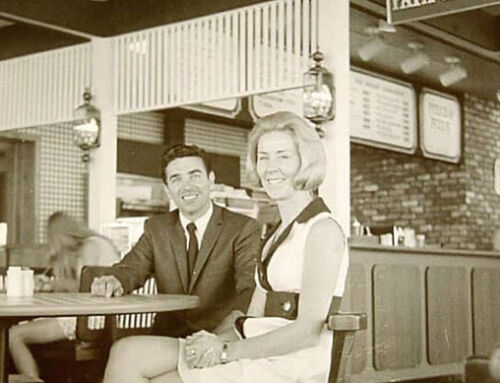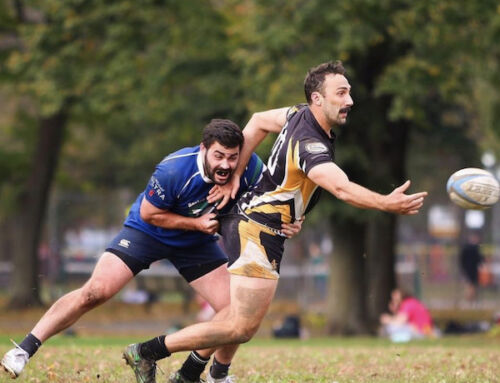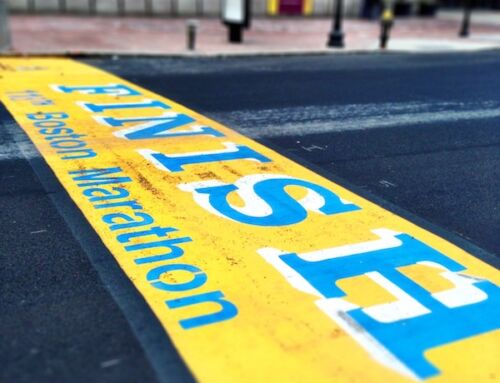Written by Tara M. Kerrigan
For many Americans, St. Patrick’s Day elicits a hodgepodge of images: beer and whiskey, corned beef and cabbage. Bagpipes, parades, saints, snakes, pagans, Christians (maybe not), but certainly four leaf clovers.
For me, one sole image pops to mind: the unsightly green carnation. If we’re going to pick on flowers here, the carnation is the perfect victim. It’s meek, unattractive and aesthetically cheap. It’s the inexpensive icon of the funeral piece. But spray paint it green and whoa does it transform… into something even incredibly tackier. Yet this ugly little eyesore holds a very special place in my heart.
If you’re from Southie, there’s a good chance you’ve donned this spray-painted little horror of a flower yourself. There’s an even better chance you’re of Irish descent. And regardless of how many generations removed, chances are you have strong emotional ties to Ireland, (or “home” as it’s called in my family). When you’re Irish, there’s a love of the homeland that resides in your soul. Even when it lays dormant, it’s always present. Like a secret, powerful magic, waiting to be unearthed, as it was for me, when I was five and first descended into Shannon airport.
Or maybe my affinity for Ireland is uncommon. Perhaps it’s because my parents are “off the boat” from Galway, and my grandmother was a leprechaun. Or at least she may as well have been, with her brogue, appearance, and mannerisms. She was the epitome of all things Irish as far as stereotypes go: she revered God, adored the Pope, relished in her 5 pm whiskey hour. Boiled the life and soul out of any ingredients that ever had the misfortune of landing in her kitchen. Above all, she loved her family fiercely and conveyed this with actions – never words. I felt connected to her in a way that no language can adequately convey.
My grandfather, having died young, left the family without a patriarch. So the women migrated to New York one by one, as the brothers ventured to England. My mother birthed two girls. So did aunt Kathleen. So each St. Patrick’s Day you’d find the seven of us at the Forester’s Club in New Rochelle, each with our cheesy green carnations pinned to our frilly dresses. We were always beside the band. Except for Uncle Ned, (the only male in our clan, God love him). Ned would steal away to the bar to cling to a moment’s peace, a cold pint, and whatever was left of his hair.
When the band would start us four little ones would take to the dance floor to disgrace ourselves with the kind of step dancing that was sure to have our ancestors twirling in their graves. But I’d always creep back to the table to observe the women, as the Irish songs flooded them with memories, luring them back into the past. I’d watch them intently, their eyes glistening with tears of nostalgia as they spoke softly about the old times back home in Ireland. The old times were hard times. The kind of times that tied them together in an impenetrable bond.
Over corned beef and cabbage, I’d hear them talk about Bobby Sands and other Irish heroes. I’d listen to their personal stories, piecing together snippets of our family history, and reveling in the chance to hear tales that would live and die with the generation before me. But tales would cease quickly when the band played, as we all respected the kind of poignant lyrics that commands one’s full attention. Songs like Grace, about an Irish Nationalist who was executed the night after his wedding. Or my personal favorite: the Green Fields of France, (about a 19 year old soldier who died in battle). There were rebel songs, patriot songs, and love songs. My mother’s favorite was “Black Velvet Band”. Gran’s was “Danny Boy”, and Kathleen’s was “The Fields of Athenry.” The collective favorites were, “The Town I loved so Well” and “Boston Rose.” But it was “Long Long Before Your Time” that transfixed them. They’d each go quiet, settle into a trance, breaking from the spell only long enough to offer a small, timid smile to each other. Then the mood would change with the tempo, as they’d burn up the dance floor with a jig and a waltz. Then they’d laugh as hard as they’d cried.
It’s the instruments (the accordion, fiddle, bodhran) that were my conduit back to Ireland. The performers were my guides. The singers, step dancers, and especially the story tellers/ poets would whisk me far away, and awaken that magic inside once more. As I got older my devotion to Ireland grew stronger. The more I came to know my family abroad, the more I felt a sense of belonging. And while most youths were enamored by the band U2, I’d attend Black 47 concerts, listening to their songs on repeat – songs like “James Connolly,” that made you want to jump into a time machine, go back in time and raise arms for Ireland. But it’s the timeless ballads, like “The Town I Loved So well,” that will always transcend, drawing me back to thoughts of the women in my family.
These women are the ties to my heritage. The ties to my family abroad, and the ties to Ireland itself. But as time slips away, and miles and circumstance scatter us all, it’s these Irish songs that will be our bond. A bond that will remind us of each other and entice our hearts back to the old days, the days when we pinned green carnations to each other’s dresses and danced (oh so badly), until we dropped.
This St. Patrick’s Day I will be far from the Forester’s Club, far from family. With them in mind, and in the name of tradition, I will proudly purchase three of those exquisitely awful green carnations. One for myself, one for my Irish friend (who will be missing family too), and the last one I will pin to my little boy’s sweater. Then we will take him to a proper Irish seisiun, and teach him about his heritage, looking forward to the day he will step foot on Eire soil to experience the magic for himself.
I will think not only of my family, but of the sons and daughters of Ireland who embodied the spirit of their lands: Sands, Connolly, Joyce, Sheehy-Skeffington, Wilde, McCourt, Yeats, (the list is far too long). Then I will raise a pint to the homeland, offer up a toast to my Gran in heaven, and tap my feet to songs that mean more to me than anyone could ever know.




